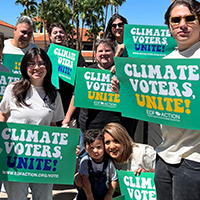Environmentalism is good politics in 2018
Protecting clean air, safe water and a healthy environment is not only good policy, it’s good politics.
We worked with LCV Action Fund on a research project that shows voters in battleground Congressional districts agree. Our poll of 20 swing Congressional districts, conducted by Global Strategy Group (GSG) found that environmental messaging is effective in these key 2018 races.
In the swing districts we surveyed, the anti-environmental candidates start out already behind by an average of 4 points on the generic ballot - 44% to 40% (45% to 43% on the named ballots). But, more to the point, when voters heard information about Trump administration environmental rollbacks, the vote shifted an additional 11 pointstoward the pro-environment candidates.
Voters are also unhappy with the policy makers who are pushing these rollbacks. EPA Administrator Scott Pruitt’s approval rating is startlingly low, with only 19 percent of voters in these relatively conservative districts holding a favorable opinion of him. The billionaire brothers, who have bankrolled the anti- environment movement, Charles and David Koch, are also deeply unpopular with just 14 percent of voters holding a favorable view of them.
Congressional votes to rollback clean air and water protections, cut EPA, and allowing drilling the Arctic National Wildlife Refuge were deeply unpopular. So were less publicized issues, like the Congressional effort to censor EPA’s science, with the so-called “HONEST Act.”
Importantly, the opposition to these policies is not partisan. As pollster Andrew Baumann writes in his memo: “Environmental messaging also speaks to less conservative members of the Republican coalition, resulting in a net 19-point shift in favor of Democrats among Republican women, and a net 17-point shift among non-conservative Republicans.”
All told, Members of Congress with troubling environmental records have real reason to be concerned this election cycle. They can choose to stand with President Trump, Scott Pruitt and the big polluters, or they can choose to stand with the majority of their constituents.
But they cannot do both.



